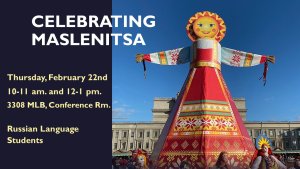
Students and instructors of Russian will gather to celebrate Maslenitsa with songs, poems, presentations, videos, and bliny!
The tradition of Maslenitsa dates back to pagan times, when Russians would bid farewell to winter and welcome spring. As with many ancient holidays, Maslenitsa has a dual ancestry: pagan and Christian. On the pagan side, Maslenitsa was celebrated on the vernal equinox day. It marked the welcoming of spring, and was all about the enlivening of nature and bounty of sunny warmth. On the Christian side, Maslenitsa was the last week before the onset of Lent (fasting which precedes Easter), giving the last chance to bask in worldly delights.
Once Lent itself begins, a strictly kept fast excludes meat, fish, dairy products, and eggs. Furthermore, parties, secular music, dancing and other distractions from the spiritual life are also strictly prohibited. In the eyes of the church Maslenitsa is not just a week of merrymaking, but a whole step-by-step procedure to prepare oneself for a long and exhausting fasting, which, if observed properly, may be a real challenge.
The name of the holiday, Maslenitsa (derived from “maslo”, which means butter or oil in Russian) owes its existence to the tradition of baking pancakes (or blini, in Russian). They are essential to the celebration of Maslenitsa. On the one hand, hot, round, and golden, pancakes, as people believed, embody a little of the sun’s grace and might, helping to warm up the frozen earth. In old days pancakes were cooked from buckwheat flour, lending them a red color, making the significance even more evident.
On the other hand, the circle has been considered a sacred figure in Russia, protecting people from evil. Hence is the habit of going on horseback around the settlement several times, decorating a cart wheel and carrying it on a pole along the streets, and dancing the khorovod (round dance). Such ceremonies were believed to butter (in Russian, the figurative meaning of the verb “to cajole”) the Sun and make it kinder. Pancakes also symbolize birth and death; in old Russia a pancake was given to a woman in labor, and is a ritual funeral repast in many homes.
Information was adapted from http://russiapedia.rt.com/of-russian-origin/maslenitsa/
The tradition of Maslenitsa dates back to pagan times, when Russians would bid farewell to winter and welcome spring. As with many ancient holidays, Maslenitsa has a dual ancestry: pagan and Christian. On the pagan side, Maslenitsa was celebrated on the vernal equinox day. It marked the welcoming of spring, and was all about the enlivening of nature and bounty of sunny warmth. On the Christian side, Maslenitsa was the last week before the onset of Lent (fasting which precedes Easter), giving the last chance to bask in worldly delights.
Once Lent itself begins, a strictly kept fast excludes meat, fish, dairy products, and eggs. Furthermore, parties, secular music, dancing and other distractions from the spiritual life are also strictly prohibited. In the eyes of the church Maslenitsa is not just a week of merrymaking, but a whole step-by-step procedure to prepare oneself for a long and exhausting fasting, which, if observed properly, may be a real challenge.
The name of the holiday, Maslenitsa (derived from “maslo”, which means butter or oil in Russian) owes its existence to the tradition of baking pancakes (or blini, in Russian). They are essential to the celebration of Maslenitsa. On the one hand, hot, round, and golden, pancakes, as people believed, embody a little of the sun’s grace and might, helping to warm up the frozen earth. In old days pancakes were cooked from buckwheat flour, lending them a red color, making the significance even more evident.
On the other hand, the circle has been considered a sacred figure in Russia, protecting people from evil. Hence is the habit of going on horseback around the settlement several times, decorating a cart wheel and carrying it on a pole along the streets, and dancing the khorovod (round dance). Such ceremonies were believed to butter (in Russian, the figurative meaning of the verb “to cajole”) the Sun and make it kinder. Pancakes also symbolize birth and death; in old Russia a pancake was given to a woman in labor, and is a ritual funeral repast in many homes.
Information was adapted from http://russiapedia.rt.com/of-russian-origin/maslenitsa/